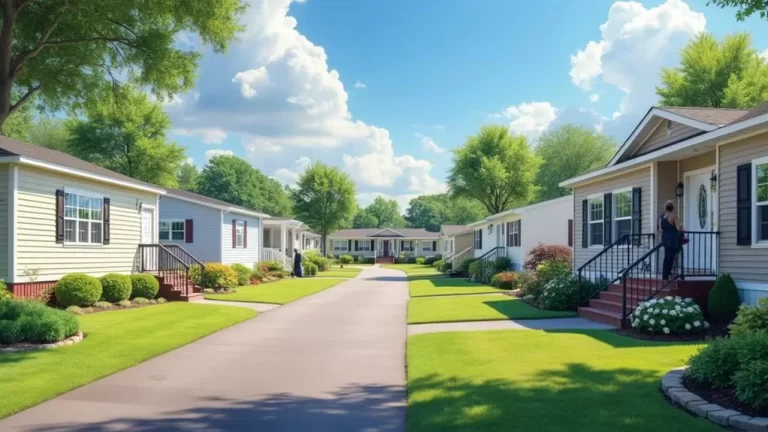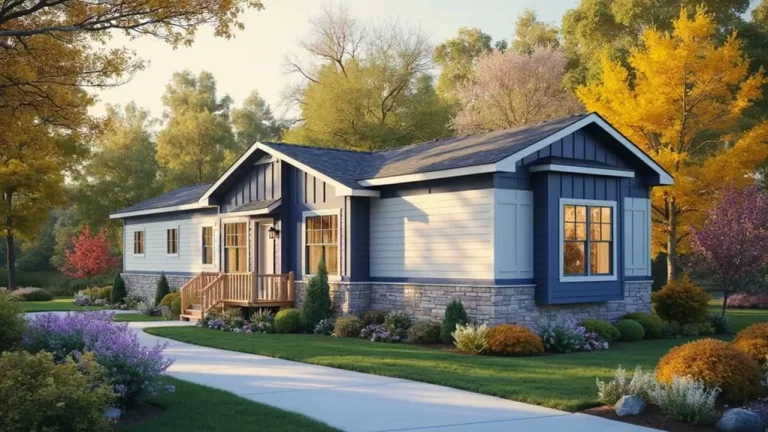
To estimate the value of your manufactured home, start by considering its age, condition, and location. Look into local market trends, as they can greatly impact value. For a precise assessment, I can use online tools like Zillow and refer to the NADA Manufactured Housing Appraisal Guide. It's also wise to check local tax assessments. Hiring a licensed appraiser offers an unbiased valuation based on a thorough evaluation of the home and its surroundings. Additionally, understanding and complying with state regulations is essential. If I apply these strategies, I'll gain a clearer picture of my home's worth.
Key Takeaways
- Use the NADA Manufactured Housing Appraisal Guide for a comprehensive and cost-effective valuation reference.
- Check local market trends and tax assessments to compare similar properties and gauge the local demand.
- Assess the home's condition, energy efficiency, and adherence to HUD standards for a more accurate valuation.
- Consider hiring a certified or state-licensed appraiser for an unbiased, professional valuation based on market trends and property condition.
Evolution of Mobile Homes
The evolution of mobile homes showcases how advances in construction technology and design aesthetics have transformed them into stylish and affordable housing options. Over the years, mobile homes have benefited from substantial improvements in building materials and methods. These advances haven't only enhanced their appeal but also made them more durable and energy-efficient. Design aesthetics have also evolved, offering a range of layouts and finishes that cater to various tastes and preferences.
Stricter regulations have played an essential role in raising safety standards. Modern mobile homes are now built to meet rigorous codes, ensuring they provide a safe living environment. This shift has made mobile homes a viable option for those seeking affordable housing without compromising on quality or safety.
The age and condition of a mobile home greatly impact its value. Older units, especially those built before 1976, may be less valuable, but proper maintenance can still result in a decent return. Location influence is another vital factor; the state, specific park, land values, and demand all contribute to the home's market worth. Additionally, amenities and upgrades can enhance the living experience and add value, making mobile homes an attractive choice in various market conditions.
Key Value Factors
When estimating my manufactured home's value, I focus on key factors like age, condition, location, and market trends.
The age and condition of the home can greatly impact its worth, with well-maintained older homes sometimes rivaling newer ones.
Additionally, the location and current market trends play a vital role, as homes in desirable areas or parks often fetch higher prices.
Age and Condition
Accurately valuing your manufactured home hinges on understanding how its age and condition interplay. The age of a manufactured home can greatly impact its value. Typically, older homes are valued lower than newer ones. However, this isn't a strict rule. If an older home is well-maintained, it can retain a decent market worth. Conversely, even a newer manufactured home can see its value plummet if it's in poor condition.
The intersection of age and condition is vital for an accurate valuation. A manufactured home's age offers a baseline, but the current state of the home can either elevate or diminish its worth. For example, an older home that's been well-maintained might hold its value better than a newer home showing signs of neglect. This means regular upkeep and timely repairs can make a noteworthy difference in your home's market worth.
To get an accurate valuation of your manufactured home, it's essential to take into account both its age and condition. Understanding this interplay allows you to assess its true value in the market and make informed decisions about potential upgrades or repairs.
Location and Market Trends
Beyond age and condition, where your manufactured home is located and prevailing market trends play an important role in determining its value. The location of your manufactured home can greatly influence its market value. Homes in desirable areas often command higher prices due to increased demand. Being close to amenities such as schools, employment centers, and transportation hubs can further enhance the value.
Understanding local economic conditions and housing market trends is essential. If the local economy is thriving, demand for housing typically rises, boosting property values. Conversely, a sluggish economy might depress home prices. It's important to stay informed about surrounding market trends to accurately estimate your home's value.
Market trends can fluctuate, influenced by broader housing market shifts and specific local factors. For instance, a well-located manufactured home in a sought-after neighborhood can appreciate over time, reflecting positive surrounding market trends. On the other hand, areas experiencing economic downturns or less demand might see stagnant or declining values.
Professional Appraisal

Hiring a licensed appraiser can give you an accurate and unbiased valuation of your manufactured home.
I'll explain the steps in the appraisal process and how to choose the right appraiser for the job.
This guarantees you get a detailed assessment that reflects your home's true worth.
Appraisal Process Steps
When an appraiser visits your manufactured home, what exactly happens during the appraisal process? Let's break it down. The appraiser begins with an on-site visit that usually lasts around 10 minutes. During this time, they take measurements, photos, and conduct system checks. These steps are essential for providing an unbiased valuation of your home.
Here's a quick look at what gets assessed:
| Aspect | Description | Importance |
|---|---|---|
| Condition | Overall state of the home | Determines repair needs |
| Features | Unique elements that add value | Impacts overall worth |
| Location | Surrounding area and amenities | Influences market value |
The appraisal process steps also include a thorough features assessment and a location assessment. These ensure that the manufactured home value is as precise as possible. The appraiser will then compile an appraisal report detailing the home's condition and making repair recommendations if needed.
Choosing the Appraiser
Selecting the right appraiser for your manufactured home is important for obtaining an accurate and fair valuation. You'll want to hire a certified or state-licensed appraiser who can provide an unbiased appraisal. Their expertise is vital, as they assess key factors like market trends, property condition, and location to determine your home's value. This professional evaluation helps you set a competitive selling price.
To find a reputable appraiser, consider seeking referrals from state appraisal boards or accreditation societies. These sources can guide you toward knowledgeable and experienced professionals. An appraiser's skill can identify overlooked aspects of your home, ensuring a thorough valuation.
Appraisal fees can vary, but investing in a professional appraisal is worth it. A thorough valuation by a certified appraiser can make all the difference in selling your home at the right price. You'll gain insights into market trends and the true condition of your property, which are important for making informed decisions.
DIY Valuation Methods
Estimating your manufactured home's value yourself can be both enlightening and cost-effective. To get started, I always turn to the NADA Manufactured Housing Appraisal Guide. This guide, often referred to as the NADA Book, provides a solid foundation for understanding your home's worth.
Another useful resource is researching local market conditions. By checking out recent sales of comparable homes, I can gauge how my home stacks up.
The condition of the mobile home plays a significant role in its value. Homes that meet HUD standards and boast energy efficiency tend to attract potential buyers more readily. I also make certain to account for any unique features my home might have, as these can add value.
Researching the value of my home isn't complete without looking at local tax assessments and using online tools like Zillow. These resources help me cross-reference my findings and ensure precision.
Legal Considerations

Understanding the legal considerations for estimating your manufactured home's value is important to guarantee compliance and accuracy. As you navigate this process, several legal factors can impact the valuation of your mobile home.
- State regulations: Each state has specific rules governing mobile homes, so understanding your state's regulations is essential.
- HUD code: Manufactured homes must meet the HUD standards, which influence their valuation and financing options.
- Zoning laws: Local zoning laws and restrictions can affect where your manufactured home can be located, impacting its overall value.
Consulting with legal experts or real estate professionals can help you understand these complexities. They can guide you through the nuances of state regulations, HUD code compliance, and zoning laws, ensuring your valuation process is thorough and compliant.
Additionally, they can assist with verifying ownership documentation and resolving title issues, which are important for establishing your home's true value.
Selling Channels
Having navigated the legal considerations, let's explore the various selling channels to maximize the value of your manufactured home. Each channel has its own pros and cons, and understanding these can help you make an informed decision.
Selling through Real Estate Agents can leverage their expertise in pricing, provide wider exposure, and assist with negotiations, potentially yielding a higher sale price. However, this comes with commission fees.
Direct Selling gives you more control over the process but demands significant effort and time investment. You'll need to manage everything from advertising to negotiations.
Wholesale Selling can be a quicker route but might not fetch the highest sale price. It's often a trade-off between speed and profit.
Retail Selling typically results in higher sale prices and involves direct negotiations and home showings, which can be time-consuming.
Additionally, listing in Mobile Home Parks and utilizing a Comparative Market Analysis can help you understand your Local Market better.
Here's a quick comparison:
| Selling Channel | Pros and Cons |
|---|---|
| Real Estate Agents | Expertise, wider exposure, fees |
| Direct Selling | Control, time-intensive |
| Wholesale Selling | Quick, lower sale price |
| Retail Selling | Higher sale price, time-consuming |
| Mobile Home Parks | Market-specific insights |
Each approach has unique benefits and challenges, so choose the one that aligns best with your goals and circumstances.
Increasing Home Value

Enhancing the value of your manufactured home can be achieved through strategic upgrades and modern amenities. By carefully selecting improvements, you can greatly increase your home's value while ensuring compliance with HUD standards.
Here's a quick list of effective upgrades to keep in mind:
- Energy-saving appliances: Swapping out old appliances for energy-saving models can enhance your home's appeal and reduce utility costs.
- Granite countertops: Installing granite countertops in the kitchen and bathrooms can add a touch of luxury and durability.
- Contemporary amenities: Adding features like smart home technology or updated fixtures can make your home more attractive to potential buyers.
When planning these enhancements, it's crucial to focus on those that offer the best return on investment. Not all repairs or improvements will lead to a value increase, so weigh the cost and time investment thoughtfully.
Upgrading your manufactured home with energy-saving and contemporary amenities, while ensuring compliance with HUD standards, can greatly enhance its market value. By making wise choices, you can enhance your living space and make it more appealing to buyers.
Frequently Asked Questions
How Do I Calculate the Value of My Mobile Home?
To calculate the value of my mobile home, I'd start with market research and a condition assessment. I'd look at comparable sales, consider its age, location impact, and upgrades. Then, I'd get an appraisal, factoring land ownership, depreciation, and inspection results.
What Is the Blue Book on a Mobile Home?
The Blue Book on a mobile home, known as the NADA Book, provides a definition and appraisal process for estimating value. Factors like manufacturer, model, and market trends influence value. Improvements impact resale value, and depreciation rates vary.
What Is the Nada Book on Mobile Homes?
The NADA book on mobile homes offers an accurate overview for mobile home appraisal. It's essential for estimating value, understanding mobile home pricing, and knowing your manufactured home's worth. The NADA guide updates guarantee current valuations.
What Increases the Value of a Manufactured Home?
Upgraded features, energy efficiency, and a well-maintained lot size can boost my home's value. Location impact, market trends, and neighborhood amenities matter too. Age factor, exterior appearance, and interior condition also play pivotal roles in determining worth.



